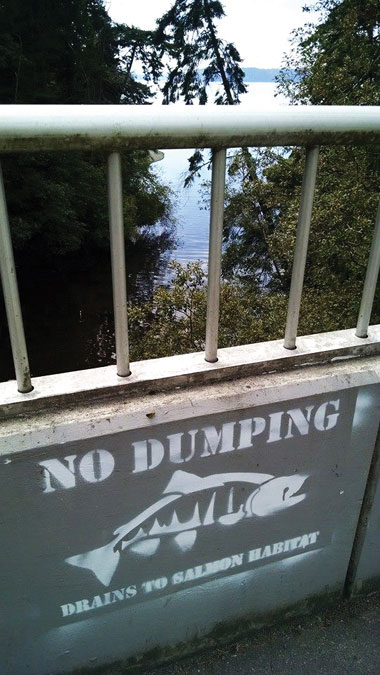Click the highlighted link below to download the September 10, 2014 Tulalip See-Yaht-Sub
Click here to download September 10, 2014 See-Yaht-Sub
syəcəb
Click the highlighted link below to download the September 10, 2014 Tulalip See-Yaht-Sub
Click here to download September 10, 2014 See-Yaht-Sub
By Brandi N. Montreuil, Tulalip News

TULALIP – Through the summer break, 175 storm drains on the Tulalip Indian Reservation received a mini makeover due to a collaborative effort between Tulalip Tribes Natural Resources department and the Goodwill Aerospace Program.
Receiving help from 20 students from the Marysville/Everett area who participated in the Goodwill Aerospace program, the drains, located near the Tulalip Resort Casino, Totem Beach Road and Totem Beach Loop Road, now display a stenciled salmon graphic and custom message reading, “No Dumping; Drains to Salmon Habitat.” Tulalip Natural Resources hopes the message will remind the public of the risks salmon habitat face.
“Many people have the misperception that a drain in a street or parking lot is sent to a wastewater treatment plant, but it is not,” explains Valerie Streeter, Tulalip Natural and Cultural Resources stormwater planner. “ After a rain storm, stormwater runoff enters the drain and is usually piped directly to a ditch, stream or bay with very little treatment. This water picks up heavy metals, copper from brake pads, Zinc from tires, and oils from engines, and delivers these pollutants to our waterways. Salmon are especially sensitive to copper, which alters their response to predators and damages their olfactory organs, how they smell. Zinc and oils also damage aquatic plants and animals.”
Students involved in the program were required to participate in service learning projects, which involves learning about the science and background of a project and then volunteer their time toward that project.
“Protecting our watersheds and salmon habitat are very important and we want the community to understand that dumping anything down storm drains can impair fish and other aquatic creatures because storm drains drain directly to streams, lakes, and even the bay,” said Kelly Finley, Tulalip Tribes Natural Resources Outreach and Education Coordinator.
Streeter explains that when people wash their cars or driveway and either dump or allow the dirty wash water into the storm drains, this contributes to water pollution. “It is better to wash your car on the lawn or use a car wash, which are connected to wastewater treatment plants. Pet waste is another common pollutant in our water, which can pass diseases on to other animals or even us humans.”
“The worst is an old practice of dumping used oil from an oil change into the storm drains,” said Streeter, who recommends discarding used oil at appropriate places, such as the automotive center at the Walmart Supercenter located in Quil Ceda Village, who will discard the oil free of charge.
For more information on how you can help in salmon recovery, please visit Washington State Recreation and Conservation Office’s website at www.rco.wa.gov/salmon_recovery/what_you_can_do.shtml.
Brandi N. Montreuil: 360-913-5402; bmontreuil@tulalipnews.com
By Brandi N. Montreuil, Tulalip News

Parents are receiving a new resource tool this school season with a smartphone app called “Knowbullying.” The free app, available for Android and iPhone, and created by the Substance Abuse and Mental Health Services Administration (SAMHSA) in conjunction with StopBullying.gov Federal partnership, is being touted as an app to help parents and others prevent bullying.
This might interest Washington parents and educators as the state is ranked number five in the nation with the highest number of bullying incidents, according to a June 2013 report from Simplefacts.org.
As students across the nation finish their first week of school, bullying may not be a large concern until it happens. The American Academy of Child and Adolescent Psychiatry states, “close to half of all children will experience school bullying at some point while they are at primary or secondary school.” In 2010, 71 percent of students reported bullying as an on-going problem. Grades 4 through 8 were reported as the years with the highest bullying incidents, with 90 percent of students experiencing some form of bullying.
Bullying can happen through a variety of mediums such as social media, known as cyber bullying, verbal abuse and intimidation, text messages and physical abuse. Knowing the signs of bullying can help prevent further acts of bullying that can lead to lasting physical and emotional impacts.
“KnowBullying” provides parents and educators the tools they need to engage youth in conversations about bullying. Through the app, you are provided conversation starters, tips and learning strategies to prevent bullying for ages 3-6, 7-13 years, and teens. The app also provides warning signs to recognize if your child is engaging in bullying, being bullied, or witnessing bullying, and connects you to social media within the app where you can share successful strategies and find useful advice via Facebook, Twitter, email, and text messages.
“The KnowBullying app empowers parents and caregivers by placing resources they need right in their hands to help prevent bullying,” explains Paolo del Vecchio, director of SAMHSA’s Center for Mental Health Services, in a press release on the apps official release. “This needs to be part of a community-wide effort to help protect our children from the unnecessary harm, and in some cases, devastating long-term consequences of bullying.”
You can download “KnowBullying” for free from the Android Play store and iTunes for iPhone. For more information about bullying or how to prevent it, please visit the website www.bullyingstatistics.org.
Brandi N. Montreuil: 360-913-5402: bmontreuil@tulalipnews.com

By Brandon Adam, The Arlington Times
TULALIP — They toured alongside John and Tom Fogerty during the 1960s as the driving rhythm for Creedence Clearwater Revival, and they’ll be performing at the Tulalip Amphitheater Sunday, Sept. 7.
Click the highlighted link below to download the September 3, 2014 Tulalip See-Yaht-Sub
Click here to download the September 3, 2014 See-Yaht-Sub
BackpackDist2014 from Tulalip News on Vimeo.
By Brandi N. Montreuil, Tulalip News
TULALIP – The annual Tulalip Tribes Youth Services backpack distribution kicked off the farewell to summer as hundreds of Tulalip youth attended a block party held on Tuesday, August 26, at the Don Hatch Jr. Youth Center.
The annual event, held at the Quil Ceda & Tulalip Elementary School in the past, was held for the first time at the youth center, which accommodated space for a large lunch, education booths, backpack distribution, and the highlight of the event: games and carnival-like activities.
Tulalip tribal youth and other Native youth, Pre-K through 12th grade enrolled in the Marysville School District, were provided a backpack filled with basic school supplies required by grade, which helps to lessen the back-to-school cost experienced by parents.
Tulalip Tribes Youth Services distributed over 1,400 backpacks during the event. Youth not present at the block party to receive a backpack may contact the Youth Services Department at 360-716-4902 to collect their backpack.
Brandi N. Montreuil: 360-913-5402; bmontreuil@tulalipnews.com
The next Food Handlers class being offered at Tulalip is Thursday, September 4th from 10:00am – 12:30pm at the Tulalip Tribes Administration Building off Marine Drive. Anyone preparing or serving food on the reservation is required to have a current food worker card. Upon completion of the class and a passing test score, a food worker card will be issued which will be valid for three years from the test date. This card is valid for employment on the reservation only.

Increased botulism infections seen in the region’s heroin users
Tulalip, Niki Cleary
In an alert from the Snohomish County Health District, local health officials were notified that Harborview Medical Center is seeing more heroin users coming in with Clostridium botulinum wound infections. Their conclusion? Likely an infected batch of heroin is being sold in this area. While many community members may not recognize the bacterium, they’ll probably recognize it’s affects, widely known as botulism.
“Normally we see this [botulism] in preserved foods,” said Bryan Cooper, ARNP Family Practice Provider at Tulalip’s Karen I Fryberg Health Clinic. “Tar heroin comes from a plant, it’s sap from the poppy, so basically the sugars there provide food for this particular bacteria. We talk about pasteurizing food, we kind of flash heat them to kill the bacteria, but they [drug dealers] don’t do that with heroin, because they don’t care.”
In any case, killing the bacteria with heat won’t solve the problem.
Cooper continued, “When users heat heroin to melt it and inject it, they kill the bacteria. But it’s not the bacteria that cause the symptoms. The bacteria produce a neurotoxin as a waste product, so even though the bacteria is dead, the neurotoxin is still there. The neurotoxin causes the double vision, slurred speech and other symptoms.”
The neurotoxin causes paralysis. When the paralysis affects the heart or lungs, the affected person dies.
“The treatment is to get an anti-toxin as soon as possible,” said Cooper. “Here’s the thing, if the onset is rapid, if it’s a high dose or you are susceptible to it, it can progress so fast that you don’t have signs and symptoms. When it goes to your respiratory system, it’s all over.”
Things to look for: Double vision, blurred vision, drooping eyelids, slurred speech, difficulty swallowing, dry mouth and muscle weakness. The user may also note blood colored discharge at the injection site.
“People who have been around a heroin user will notice that they ar acting differently.” Cooper described the effects, “You don’t necessarily get slurred speech with heroin. Here, we’ll actually see drooping eyelids while the user is awake. There will be difficulty swallowing, and even when they’re not high, these symptoms won’t go away.
“It can progress to death pretty quickly depending on the dose,” Cooper warned. “If you experience any of these symptoms, you need to neutralize the toxin as soon as possible. If we saw someone here with a confirmed case, we would send them to the emergency room and call the Snohomish County Health District so they could get the anti-toxin there right away.
“You can liken it to a snakebite,” Cooper said. A rattlesnake bite might be a low enough dose that you’ll live through it, but it’s not worth the risk of waiting. The sooner you receive the anti-venom, or in this case, the anti-toxin, the less damage it will cause.
“Recovery from botulism can last for months,” Cooper explained. “You want to administer the anti-toxin as early as possible to reduce the severity. Even though you’ve given the anti-toxin, the damage is already done. Your body has to recover from that damage.”
Injection is the likeliest way to contract botulism from heroin, but even smoking heroin doesn’t guarantee that you won’t be exposed to the disease.
“Bad teeth, bleeding gums, these can all be entry ways for botulism toxin,” described Cooper. “According to the World Health Organization (WHO), inhalation botulism is similar to foodborne botulism, but symptoms become noticeable from one to three days after exposure. It’s possible that smoking contaminated heroin could cause a user’s clothing to be contaminated. The contaminated clothing could then expose others to the toxin. The WHO’s recommendation is for the patient to shower and their clothing to be stored in plastic until it can be decontaminated by washing in soap and water”
Although, he acknowledges that heavy drug users may not notice if they are affected, Cooper explained that community members and other users can save a life by looking for these symptoms.
“There are some of us who give people rides,” said Tulalip citizen Willa McLean, “so, awareness is crucial. In case we see something on the individual, we’ll know what to do.”
Cooper pointed out that this won’t affect all needle users, for example, if you have diabetes and inject insulin, you are safe because the legal product you receive goes through numerous safeguards to ensure that it’s free from contaminants. Likewise, you can’t catch botulism the way you can catch the common cold.
“Botulism is a toxin given off by bacteria, so when the user injects contaminated heroin and therefore the toxin, they are essentially poisoned. If the needle is shared, there’s a risk that there may be a small amount of toxin in the needle or syringe. It’s not a pathogen, therefore not blood borne, airborne or contagious.”
For more information about botulism check on-line at http://www.cdc.gov/nczved/divisions/dfbmd/diseases/botulism/professional.html.
Click the highlighted link below to download the August 27, 2014 Tulalip See-Yaht-Sub Issue